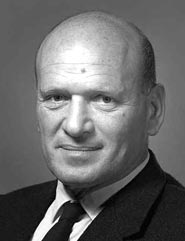Berkeleyan
Obituary
Joseph Tussman
![]()
17 November 2005
 Joseph Tussman (G. Paul Bishop photo) |
Civil liberties, constitutional law, and undergraduate education were dominating interests in Tussman's life. He attributed his concern for all three to the early influence of Alexander Meiklejohn, co-founder of the ACLU and his teacher at the University of Wisconsin at Madison during his undergraduate years.
Tussman was born in Chicago and grew up in Milwaukee, the son of Shleime Tussman, a second-generation cantor, and an eminent Yiddish poet, Malka Heifetz Tussman. Following his graduation from Wisconsin, he followed his mentor west to do graduate work at Berkeley, until his studies were interrupted by World War II. He served in an army-intelligence unit in southwest China tasked with aiding the Chinese in opening up the Burma Road after Japanese troops had cut off supplies.
Tussman was discharged in 1945 and returned to Berkeley to complete his dissertation on the English political philosopher Thomas Hobbes. He began his teaching career the following year as a lecturer in the speech department.
Around the same time, California began to require University employees to sign a loyalty oath. As described by Robert Blauner, professor emeritus of sociology, Tussman was "the key person in getting the word around to the liberal faculty" when the new requirement was announced in the back page of the Faculty Bulletin. "As a student of the civil libertarian Alex Meikle-john, Tussman smelled a rat; he went out of his way . to read the text of the oath weeks before it was ever published. He knew immediately it was a bad thing.. Tussman was indispensable in sounding the alarm."
Twenty percent of the Berkeley faculty refused to sign and 31 professors were dismissed. "Most of the liberal faculty, including the real leftists, opposed the oath on academic-freedom grounds and faculty-prerogative grounds," Blauner says. Tussman spoke out against the oath at public forums, taking the radical position that it was a positive thing for a faculty to include communists, as how else could students learn what communism was all about? "This got him reviled in the press," says Blauner. "He told me that what he really wished is that someone would have stepped forward and said, 'I'm a communist and I challenge the constitutionality of the oath.' He thought they might have a shot of winning in the court."
Being untenured, however, Tussman eventually signed the oath for economic reasons; it was the saddest day in his life, he has said.
By then an assistant professor, Tussman moved to the philosophy department in 1952, leaving in 1955 when denied tenure for insufficient scholarly publication. Over the next few years he taught at Syracuse and Wesleyan and completed his first book, Obligation and the Body Politic (Oxford Press, 1960). He returned to Berkeley in 1963 and became chair of philosophy the following year.
The crisis occasioned by the Free Speech Movement of 1964 again found Tussman in the fray. He rejected "the attempt to deal coercively and punitively with problems of mind and spirit." Working with Jacobus tenBroek, who chaired the Senate's committee on academic freedom, he supported the more permissive of two competing resolutions, noting it was "public knowledge that it is strongly supported by chairmen of departments. Nevertheless, it is a good motion." It passed by a large majority, and the crisis was resolved.
Tussman devoted considerable energy to exploring ways to reform undergraduate education. Deploring the reluctance of senior faculty to teach introductory courses and the trend toward early professional specialization for undergraduates, Tussman founded the Experimental College Program (modeled on a program that Meiklejohn had created at Madison), which was offered to 150 students through their freshman and sophomore years.
As Tussman explained in a 2000 interview in Professor Harry Kreisler's "Conversations With History" series, undergraduate education in its first two years typically offers an untenable "grab-bag or sampler" approach to education. His proposal, instead, was to offer a shared curriculum covering historical periods of great ferment (from ancient Greece through the American revolution), followed by contemporary problems and what were, for Tussman, ancient themes of citizenship.
The first two-year cycle was followed by another, but the experiment failed (though programs at the University of British Columbia and Evergreen State College in Olympia, Wash., trace their lineage to it). Tussman's assessment, in retrospect (again in "Conversations With History"), was that it was extremely difficult to institutionalize because it required eminent specialists in their fields not to teach their disciplines but to teach Homer instead. "They don't want to do it," he said, "and in my judgment, in most cases they are incap-able of doing it because they don't know how. They're mere specialists and they're not well educated."
Tussman described his vision for the program in Experiment at Berkeley, a memoir and blueprint published in 1969. His seven books include, as well, Government and the Mind (1977), and two volumes of essays, The Burden of Office: Agamemnon and Other Losers (1989) and The Beleaguered College (1997).
To the end, he argued that liberal education should be fundamentally political, while developing a critique of the encroachment of market relations into the political realm; he utterly rejected the metaphor "the marketplace of ideas."
As he told Kreisler, the image "of buying and selling as the great model for human life . seems to me to be disastrous, emotionally poverty-stricken, self-defeating, and it won't last..It treats people essentially as consumers, and consuming is not significant..You put all sorts of things on people's tombstones," he went on, "but I can't imagine anybody saying, 'Went through $3 million worth of consumer goods between 19 - and 19 -.'"
Tussman's wife, Lorrie, died in 1984; his younger brother, Hugh, died earlier this year. He is survived by his son, David, and by many friends.
Tussman's 2000 "Conversations with History" interview can be heard online at globetrotter.berkeley.edu/people/Tussman/tussman-con0.html. A full-length life history, completed recently by the campus's Regional Oral History Office, will be available in the spring at bancroft.berkeley.edu/ROHO.

